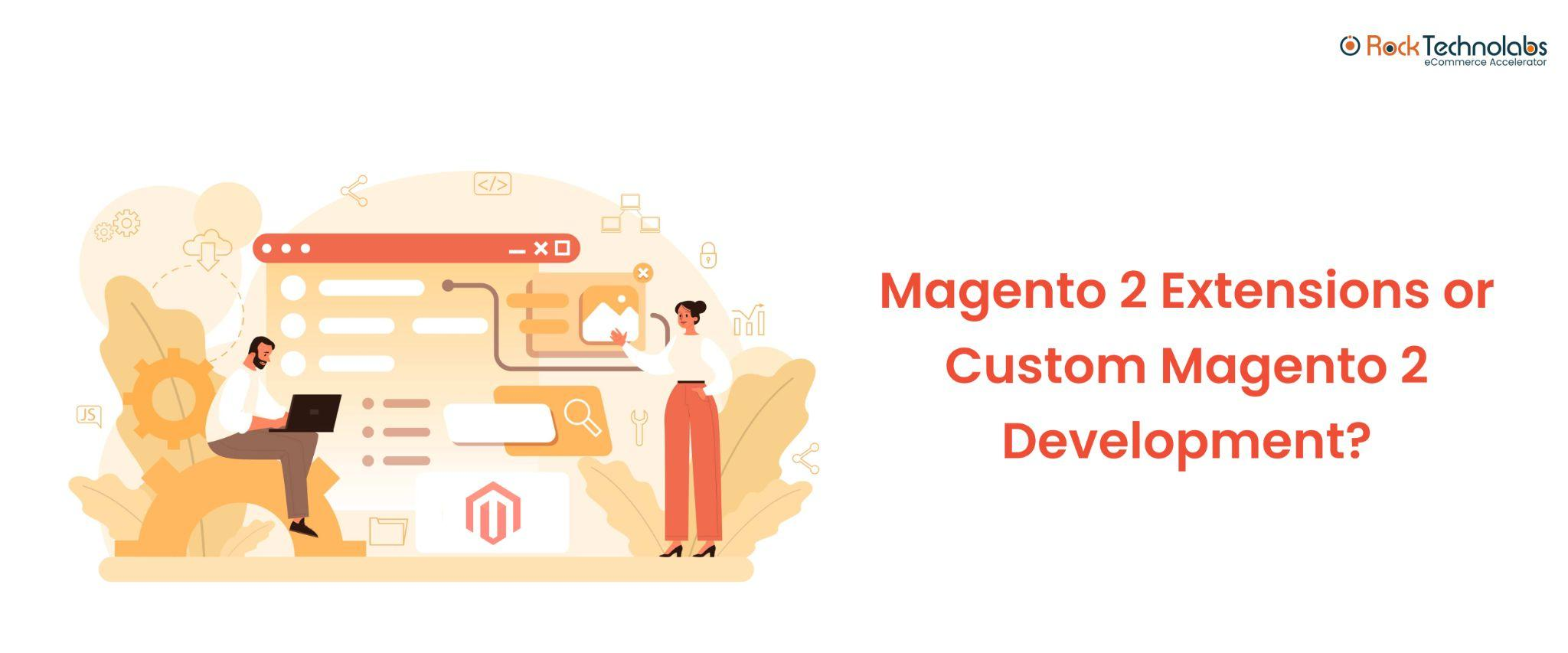Difference between Magento 2 Extensions and Customer Magento 2 Development: What to Choose?
Ecommerce solutions that are both innovative and flexible can enhance the efficiency of online businesses. Magento is a well-known eCommerce platform available right now that stays up to expectations.
According to builtwith report, there are 712,179 websites running on Magento platform. A major reason for the success of Magento 2 (Adobe Commerce) is its extensibility, which enables users to enhance their store experience through extensions and custom development.
As a means of enhancing the functionality of a Magento 2 store, two methods exist: custom development and Magento pre-built extensions.
Both approaches have advantages and disadvantages, and the best approach for a particular business depends on its unique needs and diverse criteria.
Let’s unleash the difference between Magento 2 extensions vs. custom development and by going through its pros and cons, you can decide which is a better choice for your store scalability and performance.
What are Magento 2 Extensions?
Magento 2 Extensions provide specific capabilities to your Magento 2 store by adding small code packages, often called modules, that extend its functionality. As predesigned, off-the-shelf solutions, they can be purchased and installed quickly and are easily operable on-the-fly solutions.
A wide range of eCommerce sites use Magento 2 (Adobe Commerce), which means there are more Magento 2 extensions out there. Numerous aesthetic themes, analytical reports, and mobile compatibility are available, allowing you to enhance your online store’s appearance and functionality easily.
When to get Magento 2 Extensions?
Getting Magento 2 extensions depends on your business’s specific needs and circumstances. As you consider when to acquire Magento 2 extensions, the following factors should be taken into account:
- Requirements for the project. Assess the project requirements and determine what functions you require from the extensions.
- Compatibility and stability. Be certain that you are installing extension in a stable and compatible manner, as well as using the correct extensions.
- The phase of development. Take into account the development stage of the Magento project. Extensions should be added after incorporating the website’s core functionality.
- Support and updates for the extension. Make sure that the extension developers have a great reputation and provide decent support.
Recommended: Top 10+ Magento 2 Extensions for Your Online Store For 2023
Type of Magento 2 Extensions
Modules and add-ons support Magento’s e-commerce platform and further contribute to its capabilities. The Magento platform offers many extensions to meet various requirements and needs. Magento’s extensions fall into the following categories:
- Logistics and shipping extensions. With these extensions, you will have the flexibility to collaborate with shipping companies and logistics services, providing multiple shipping options, estimating shipping costs, producing shipping labels, monitoring shipping, and effectively fulfilling orders.
- An extension for product management. There are many extensions available to manage product inventory better such as advanced product attributes, export/import, Magento 2 Pre Order, organization of the catalog, Out of Stock Magento 2 and filtering of products.
- Extensions for the customer experience. Magento 2 extensions are designed to improve the overall shopping experience for your customers. A wide range of options may be available, including personalized recommendations, ratings and reviews of products, rewards programs, the management of wish lists, interactive chat support, and powerful search tools.
- Reporting and Analytics Extensions. By using these extensions, it will be possible to analyze and track different aspects of your online business, including sales results, consumer behavior, sales conversions, and the effectiveness of marketing campaigns.
Cost ranges of Magento 2 Extensions
Many factors can influence the price of Magento 2 extensions, including functionality, complexity level, developer credibility, and availability of support and updates. Below, we have shared an idea of the range of costs:
- Free or Low-Cost Extensions. Magento Marketplace offers a lot of free extensions with basic functionality. Smaller companies or the Magento community often develop these extensions. A low-cost extension can cost anywhere from $10 to $500.
- A mid-range extension. The functionality of these extensions is more advanced and usually offers more features. More prominent companies or individuals usually develop them. Mid-range extensions cost between $100 and $2000.
- Extensions with high-end features. A high-end extension usually has a lot of features and support. Well-established Magento development companies develop these extensions. Depending on the level of customization, high-end extensions may cost between $500 and a thousand dollars.
Custom development costs range widely depending on the project’s complexity, the variety of features, the degree of customization desired, and the developer’s hourly rate.
Custom extension development costs are much higher than the costs associated with buying pre-built extensions.
How many Magento 2 extensions are usually present in a store?
An online store’s Magento 2 extension count highly depends on the store owner’s specific needs. A store typically contains a variable number of extensions.
In terms of how many extensions, a store uses depends on several factors, including how complex its functionality is, how many features and capabilities it desires, and the industry in which the store operates. It is common for shops to have only a few extensions providing essential features such as shipping and payment gateways.
Those with more extensions can enhance marketing, customer service, analytics, and more aspects of their e-commerce operations.
The excessive use of extensions can impact performance and complicate maintenance, even though extensions add extra features and functionality.
Pros and Cons of Choosing Magento 2 Extensions
Pros of Magento 2 Extensions
Extensions aren’t that expensive.
Extensions are considerably cheaper than custom development, around $50 to $500. Thus, they opt for newer or smaller eCommerce stores where budgets are paramount.
Useful and immediate.
The advantage of ready-to-use extensions straight from the shelf is that they do not require any designing or testing on your part. Furthermore, since most extensions on the market have existed for some time, they have typically been updated, improved, and generally debugged (a problem often encountered with custom Magento 2 development).
Support is included.
The instructions that come with Magento extensions support team include comprehensive instructions, and most extensions offer unlimited updates, making it easy to stay current.
Options are plentiful
A wide range of extensions is available in the Magento marketplace, developed by several vendors. As a result, you can select the features that match your business specifications from a wide range.
Cons of Magento 2 Extensions
It may slow down your store.
Since extensions are cheap, store owners use many to customize their shops. Most plugins are well-coded, independent modules but only sometimes work together, resulting in a significantly slower website. Therefore, it is wise to use extensions prudently.
Limited customization capabilities.
Even though extensions offer additional features, you may still face challenges to meet your organization’s requirements. Often, customization options are limited, and certain design or functionality features may have to be compromised.
The possibility of conflict.
If more than one extension is installed, there may be a conflict between them. The result may be performance issues, compatibility issues, or functional issues. By thoroughly testing and carefully selecting extensions, this risk may be mitigated.
What is Custom Magento 2 Development?
Magento 2 development services involves customization for your specific business requirements, which will allow you to minimize the number of extensions you will have to install and have products specifically tailored to your business requirements.
Custom Magento development is a great option that allows businesses to reach their goals and design e-commerce stores and websites they are happy with, and equipped the store with advanced functionalities.
Furthermore, the landing page could also be customized to make it more attractive than it initially appeared, along with the URLs, to improve the SEO of the site. Each Magento user can use custom development for their website or store to enhance sales and conversion.
Cost range of Custom Magento 2 Development
Several factors can influence the price of custom Magento 2 development. It is essential to consider the project’s complexity, requirements for custom functionality, the number of team members, customizations needed for design and UI, and the team’s location. For an idea of general costs, the following figures can vary, but please keep in mind that they are only approximate estimates:
- Medium-sized custom development projects. Large to medium-sized projects that require extensive customization, integration with third-party systems, and high levels of customization can cost anywhere between $30,000 and $60,000.
- Small-Scale Custom Development. If the project entails a few custom features or minor modifications, the cost will likely be between $10, 000 and $30,000. Working with a smaller team of developers and dedicating more time to specific customization is advisable.
Pros and Cons of Choosing Custom Magento Development
Pros of Custom Magento 2 Development
Custom Magento 2 Development is the superior choice for designing online stores for your enterprise. With custom development, practically anything is possible. Even yet, bypassing the technical details and aesthetics for a moment, custom development is advantageous because it requires a much smaller amount of code to achieve the objectives. Your store will function more efficiently with code tailored to your brand’s needs.
Growing Business with custom developments.
Since business is fluid and changing, custom eCommerce solutions can be adapted and expanded as your business grows. The functionality can be seamlessly inserted into your code when a new feature is required. When you hire magento programmer for your project, you assure your store safety and 24X7 support.
Have a competitive edge
With custom Magento 2 development, your online store can be distinguished from your competitors, who may use off-the-shelf extensions. A brand’s uniqueness can significantly set it apart, improving customer experience and increasing conversion rates.
Flexibility and scalability
With custom Magento 2 development, your e-commerce store can be scalable and adapted to accommodate your business’s growth. Using the platform, it is possible to easily integrate third-party systems and new features without restriction on pre-built extensions.
Cons of Custom Magento 2 Development
Estimation of costs
It’s no surprise that Magento custom development is expensive. According to the client’s requirements, a custom eCommerce store may cost anywhere from $20,000 to more than $100,000. Website maintenance and updates are ongoing expenses for small businesses, resulting in an unattractive alternative to custom development.
Need team of professional developers
Custom development will require design and testing instead of Magento extensions, generally ready to use shortly after installation.
Add Marketplace Approved Magento 2 Extensions or Get Trusted Magento 2 Partner for Custom Development:
Custom Magento 2 development and Magento 2 extensions both have their pros and cons. As you choose between the two, consider your budget, timeline, and scalability requirements.
The Magento 2 extensions provide businesses with a wide range of functionality at a very reasonable cost. Additionally, custom development provides unparalleled flexibility, personalization, and expandability, with a higher price tag and a longer development time.
To make a well-informed decision, carefully examine your requirements, research the available options, and consult with a qualified team of professionals. If you are still confused whether to go with custom development or pre-built extension or looking for support, let our developers guide you as we are into the ecommerce industry since the past 1 decade and know which strategy will be perfect for our client.



